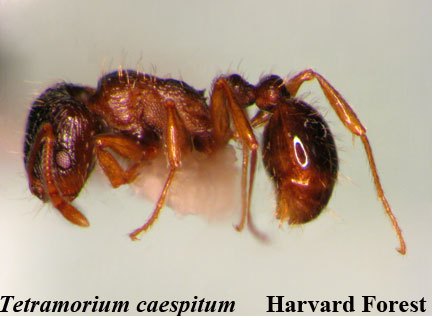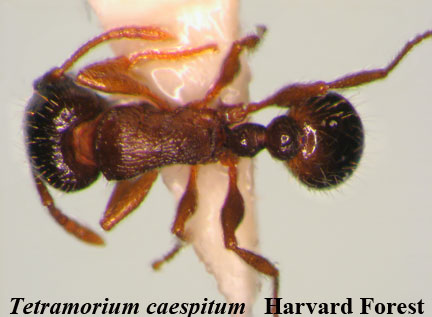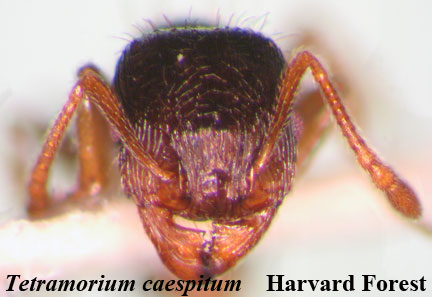1a. Tiny ant, antennae with 10 segments; no propodeal spines; tiny eyes (< 15 ommatidia) Solenopsis
1b. Antennae with 11 or 12 segments 2
2a. Antennae with 11 segments 3
2b. Antennae with 12 segments 6
3a. Gaster heart-shaped; petiole attached dorsally to gaster Crematogaster
3b. Gaster not heart-shaped; petiole attachment anterior 4
4a. Frontal carina short, no antennal scrobe (groove in which antenna sits) 5
4b. Frontal carina longer (extending beyond eye), forming an antennal scrobe Protomognathus americanus
5a. Eyes with short, erect hairs between the ommatidia Fromicoxenus provancheri
5b. Eyes without erect hairs between the ommatidia Leptothorax (muscorum group)
6a. Petiole short, no scale or node, and with no anterior peduncle. Two pairs of propodeal spines Myrmecina americana
6b. Petiole usually with a node and distinct anterior peduncle. 0 or 1 pair of propodeal spines 7
7a. Posterolateral portions of clypeus raised into a sharp ridge (“carina”) that forms an antennal socket.Sting with small triangular appendage on dorsal end. On rocks and pavement. Tetramorium caespitum
7b. Sting simple, clypeus “normal” 8
8a. Middle and hind tibial spurs finely pectinate (view at 100x); thorax with modest break between segments, furrows/rugae on sides Myrmica
8b. Middle and hind tibial spurs simple or absent. Maxillary palps #5-segments; labial palps # 3 segments 9
9a. No spines on propodeum; antennal club with 3 segments Monomorium
9b. Spines on propodeum 10
10a. Antennal club 3-segmented 11
10b. Antennal club 4-segmented 12
11a. Workers dimorphic (large, small); majors (large workers) with huge heads normally with distinct occipital lobes. “Sutures” impressed on rear side of altitrunk Pheidole
11b. Workers not dimorphic, head proportions normal Temnothorax
12a. Antennal scapes short , not reaching occiptal border; eyes small or vestigal; small ants (2.5-4.3mm long) Stenamma
12b. Eyes prominent, antennal scapes longer; antennal club prominent, larger ants; clypeus lacking a ridge; thorax with large break between segments Aphaenogaster
Tetramorium caespitum


